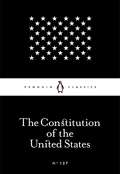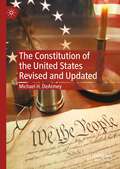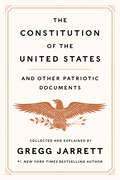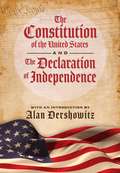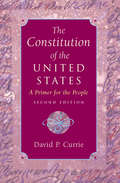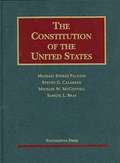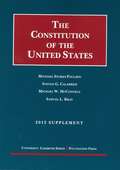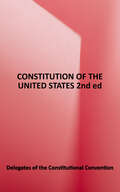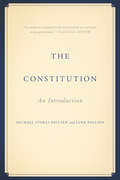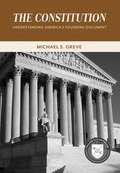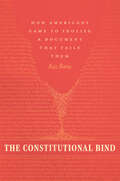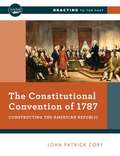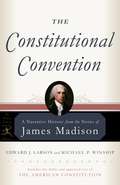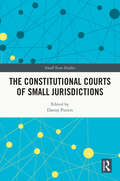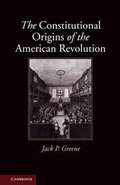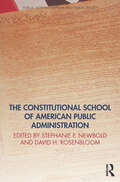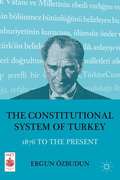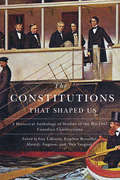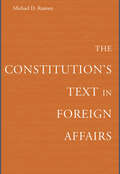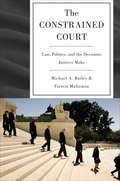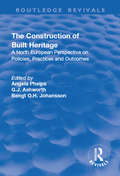- Table View
- List View
The Constitution of the United States (Penguin Little Black Classics)
by Founding FathersBoth enshrining the fundamental rights and freedoms of its citizens in law, and curbing the power of those who rule them, the US constitution is one of the most significant documents in the history of democracy.
The Constitution of the United States Revised and Updated
by Michael H. DeArmeyAt this moment of extreme political polarization in the U.S. which has the potential to threaten the very foundations of the state, Professor Michael DeArmey proposes a revised and updated Constitution. This enriched, reborn Constitution retains much of the current Constitution but also seeks to meliorate and indeed resolve entirely many of the seemingly intractable problems in American democracy. The rights of American citizens are revisited and expanded, and for the first time a wholly new Bill of Goods sets out government’s role in assisting in the necessities for life. Also new is a Bill of Citizen Duties and Responsibilities. The book contains a careful defense of the proposed changes, including individual chapters focusing on the most controversial topics. Other chapters explore why a constitution is needed and survey the Federalist papers on Constitutional structure. The book also examines the writings of Aristotle, John Adams’ Defence, and the correspondence of Madison and Jefferson.
The Constitution of the United States and Other Patriotic Documents
by Gregg JarrettA collection of some of the most important documents and speeches that have shaped America, with commentary and insights from Fox News star and author of the #1 New York Times bestseller The Russia Hoax, Gregg Jarrett.In this volume, the Constitution and the Declaration of Independence are brought together with dozens of other historic documents and speeches which shaped the destiny of the United States of America. Also included are the Bill of Rights, the Federalist Papers, and the Articles of Confederation. Gregg Jarrett introduces and explains how each of these great documents created the America we know today.In addition to these Founding documents, this deluxe keepsake contains other legendary works from our nation’s history, including Frederick Douglass’s July 4th speech, Abraham Lincoln’s Second Inaugural Address, Martin Luther King Jr.’s “I Have a Dream” speech, and Ronald Reagan’s Berlin Wall speech.A tribute to the great minds and indelible words that have made America great, The Constitution of the United States and Other Patriotic Documents is essential for every patriot and anyone interested in knowing and understanding the course of American history.
The Constitution of the United States and The Declaration of Independence
by Alan Dershowitz Delegates of The Constitutional ConventionIncluding a new introduction by eminent civil libertarian and New York Times bestselling author Alan Dershowitz, this edition of the US Constitution is a must-have for all Americans and anyone interested in American history. This quick, easy reference for our federal government’s structure, powers, and limitations includes: Introduction by Alan Dershowitz (author of the New York Times bestseller The Case Against Impeaching Trump)The Constitution of the United StatesThe Bill of RightsAll Amendments to the ConstitutionThe Declaration of IndependenceThe Constitution of the United States and The Declaration of Independence are two of the most important documents in American history. Conveying the principles on which the country was founded and providing the ideals that still guide American politics today, these are the seminal works from which the foundation of America was built. Signed by the members of the Constitutional Convention in Philadelphia on September 17, 1787, The Constitution outlines the powers and responsibilities of the three chief branches of the federal government, as well as the basic rights of the citizens of the United States. The Declaration of Independence was crafted by Thomas Jefferson in June of 1776 and it provides the basis of all American political philosophy and civil liberties. Collected here in one affordable, pocket-sized volume are some of the most valued pieces of writing in American history. Every American, regardless of political affiliation, should own a copy.
The Constitution of the United States: A Primer for the People
by David P. CurrieA masterly introduction to the United States Constitution, this slim book leads the reader through a concise overview of the document's individual articles and amendments. With clear and accessible language, Currie then examines each of the three branches of the federal government and explains the relation between the federal and state governments. He analyzes those constitutional provisions that are designed to protect citizens from governmental interference, such as the due process and equal protection clauses and the confusing first amendment provisions respecting the separation of church and state, and includes discussions of judicial review and freedom of speech and of the press. A sympathetic yet critical guide, Currie's book enables students and laypersons to understand one of the cornerstones of the Western political tradition. The second edition, along with an updated chronology and bibliography, incorporates the Supreme Court decisions over the past decade that have affected constitutional interpretation. "Superb . . . highly recommended for those seeking a reliable, understandable, and useful introduction to our constitution."—Appellate Practice Journal and Update
The Constitution of the United States: A Primer for the People, Second Edition
by David P. CurrieA masterly introduction to the United States Constitution, this slim book leads the reader through a concise overview of the document's individual articles and amendments. With clear and accessible language, Currie then examines each of the three branches of the federal government and explains the relation between the federal and state governments. He analyzes those constitutional provisions that are designed to protect citizens from governmental interference, such as the due process and equal protection clauses and the confusing first amendment provisions respecting the separation of church and state, and includes discussions of judicial review and freedom of speech and of the press. A sympathetic yet critical guide, Currie's book enables students and laypersons to understand one of the cornerstones of the Western political tradition. The second edition, along with an updated chronology and bibliography, incorporates the Supreme Court decisions over the past decade that have affected constitutional interpretation. "Superb . . . highly recommended for those seeking a reliable, understandable, and useful introduction to our constitution. "—Appellate Practice Journal and Update
The Constitution of the United States: Text, Structure, History, and Precedent
by Steven G. Calabresi Michael W. Mcconnell Michael Stokes Paulsen Samuel L. BrayThis large casebook on constitutional law provides a comprehensive examination of the United States Constitution including discussions of modern Supreme Court precedent and current case law but focusing strongly on the original text, legislative handling of constitutional law issues and the first one hundred and fifty years of precedent cases. The work is divided into two sections covering the structure and powers of the national government and rights against the government and chapters cover each article and amendment to the constitution outlining each piece of important case law and providing study and discussion questions. Paulsen is professor of law at the University of St. Thomas, Calabresi at Northwestern University, McConnell at Stanford University and Bray is the executive director of the Stanford Constitutional Law Center. Annotation ©2011 Book News, Inc. , Portland, OR (booknews. com)
The Constitution of the United States: Text, Structure, History, and Precedent, 2012 Supplement
by Steven G. Calabresi Michael Stokes PaulsenThis is the 2012 Supplement to Paulsen, Calabresi, McConneell, and Bray's The Constitution of the United States casebook.
The Constitution of the United States: With Index, and the Declaration of Independence
by Delegates of the Constitutional ConventionThe Constitution of the United States, with Index, and The Declaration of Independence: Pocket Edition This Constitution was proofed word for word against the original Constitution housed in the Archives in Washington, D.C. It is identical in spelling, capitalization, and punctuation. It is sized in accordance with one produced by President Thomas Jefferson and includes the Bill of Rights, Amendments 11 through 27, The Declaration of Independence and a complete index of the Constitution. 52 pages. 3-1/4 x 6-1/2 inches. Published by the National Center for Constitutional Studies, a nonprofit educational foundation dedicated to restoring Constitutional principles in the tradition of America's Founding Fathers.
The Constitution: An Introduction
by Luke Paulsen Michael PaulsenFrom war powers to health care, freedom of speech to gun ownership, religious liberty to abortion, practically every aspect of American life is shaped by the Constitution. This vital document, along with its history of political and judicial interpretation, governs our individual lives and the life of our nation. Yet most of us know surprisingly little about the Constitution itself, and are woefully unprepared to think for ourselves about recent developments in its long and storied history.The Constitution: An Introduction is the definitive modern primer on the US Constitution. Michael Stokes Paulsen, one of the nation's most provocative and accomplished scholars of the Constitution, and his son Luke Paulsen, a gifted young writer and lay scholar, have combined to write a lively introduction to the supreme law of the United States, covering the Constitution's history and meaning in clear, accessible terms.Beginning with the Constitution's birth in 1787, Paulsen and Paulsen offer a grand tour of its provisions, principles, and interpretation, introducing readers to the characters and controversies that have shaped the Constitution in the 200-plus years since its creation. Along the way, the authors provide correctives to the shallow myths and partial truths that pervade so much popular treatment of the Constitution, from school textbooks to media accounts of today's controversies, and offer powerful insights into the Constitution's true meaning.A lucid and engaging guide, The Constitution: An Introduction provides readers with the tools to think critically and independently about constitutional issues-a skill that is ever more essential to the continued flourishing of American democracy.
The Constitution: Our Written Legacy
by Joseph A. MeluskyHelps students study constitutional principles, issues, and applications in some depth, and to better understand the importance of the document in contemporary times, this book contains excerpts from the Federalist Papers, some landmark Supreme Court opinions, and the texts of some important documents including the Magna Carta, the Declaration of Independence, the Bill of Rights, and others.
The Constitution: Understanding America's Founding Document
by Michael S. GreveFor well over two centuries, the United States Constitution has served as a charter for a free, democratic government and for a country that has risen from a dicey political experiment to an economic and political superpower. In the history of the world, there is nothing like it. In The Constitution: Understanding America s Founding Document, Michael S. Greve explains how to think seriously about the United States Constitution and constitutions in general. What are constitutions supposed to do, and what can they accomplish? Why was the specific form of the Constitution including both its structure and its rights catalogue so important? Why is the Constitution so difficult to amend? Greve provides a fresh perspective on the Constitution s structure and our enduring constitutional controversies, from federalism and the separation of powers to slavery, civil rights, and the administrative state.
The Constitution: Yesterday and Today and Tomorrow
by Barbara Silberdick FeinbergA great story of American history and freedom, elaborating on how important the constitution is, what it means to people and how hard it has been to keep it the way it is today.
The Constitutional Bind: How Americans Came to Idolize a Document That Fails Them
by Aziz RanaAn eye-opening account of how Americans came to revere the Constitution and what this reverence has meant domestically and around the world. Some Americans today worry that the Federal Constitution is ill-equipped to respond to mounting democratic threats and may even exacerbate the worst features of American politics. Yet for as long as anyone can remember, the Constitution has occupied a quasi-mythical status in American political culture, which ties ideals of liberty and equality to assumptions about the inherent goodness of the text’s design. The Constitutional Bind explores how a flawed document came to be so glorified and how this has impacted American life. In a pathbreaking retelling of the American experience, Aziz Rana shows that today’s reverential constitutional culture is a distinctively twentieth-century phenomenon. Rana connects this widespread idolization to another relatively recent development: the rise of US global dominance. Ultimately, such veneration has had far-reaching consequences: despite offering a unifying language of reform, it has also unleashed an interventionist national security state abroad while undermining the possibility of deeper change at home. Revealing how the current constitutional order was forged over the twentieth century, The Constitutional Bind also sheds light on an array of movement activists—in Black, Indigenous, feminist, labor, and immigrant politics—who struggled to imagine different constitutional horizons. As time passed, these voices of opposition were excised from memory. Today, they offer essential insights.
The Constitutional Convention of 1787: Constructing the American Republic (Reacting to the Past Series)
by John Patrick CobyA Norton original in the Reacting to the Past series, The Constitutional Convention of 1787: Constructing the American Republic brings to life the debates that most profoundly shaped American government. As representatives to the Convention, students must investigate the ideological arguments behind possible structures for a new government and create a new constitution. <p><p> Reacting to the Past is an award-winning series of immersive role-playing games that actively engage students in their own learning. Students assume the roles of historical characters and practice critical thinking, primary source analysis, and argument, both written and spoken. Reacting games are flexible enough to be used across the curriculum, from first-year general education classes and discussion sections of lecture classes to capstone experiences and honors programs.
The Constitutional Convention: A Narrative History from the Notes of James Madison (Modern Library Classics)
by James Madison Edward J. Larson Michael P. WinshipIn 1787, the American union was in disarray. The incompatible demands of the separate states threatened its existence; some states were even in danger of turning into the kind of tyranny they had so recently deposed. A truly national government was needed, one that could raise money, regulate commerce, and defend the states against foreign threats--without becoming as overbearing as England. So thirty-six-year-old James Madison believed. That summer, the Virginian was instrumental in organizing the Constitutional Convention, in which one of the world's greatest documents would be debated, created, and signed. Inspired by a sense of history in the making, he kept the most extensive notes of any attendee. Now two esteemed scholars have made these minutes accessible to everyone. Presented with modern punctuation and spelling, judicious cuts, and helpful notes--plus fascinating background information on every delegate and an overview of the tumultuous times--here is the great drama of how the Constitution came to be, from the opening statements to the final votes. This Modern Library Paperback Classic also includes an Introduction and appendices from the authors.
The Constitutional Courts of Small Jurisdictions (Small State Studies)
by Danny PietersThe Constitutional Courts of Small Jurisdictions identifies features and challenges common to the constitutional courts of small state jurisdictions in Europe.The constitutional courts of the following small state jurisdictions are explored: Andorra, Cyprus, Estonia, Liechtenstein, Luxembourg, Malta, Monaco, Montenegro, and San Marino. For each country’s constitutional court, the following matters are examined: the history of the court; its composition; its standing and the types of proceedings; jurisdiction of the court; procedural steps and rules; the nature and effect of the decisions rendered; relations with other courts (CJEU, ECHR, etc.); and current issues and future developments. The book concludes by identifying some common features and challenges that constitutional courts of small states are confronted with, formulating recommendations for other small state jurisdictions across the world.This book will be of great interest and use to practitioners and scholars working in and researching constitutional law in general, and constitutional courts in particular. It will be invaluable for those dealing with small states, as it pays attention to an often forgotten - but important - aspect of the rule of law, and thus also of democracy.
The Constitutional Origins of the American Revolution
by Jack P. GreeneUsing the British Empire as a case study, this succinct study argues that the establishment of overseas settlements in America created a problem of constitutional organization. The failure to resolve the resulting tensions led to the thirteen continental colonies seceding from the empire in 1776. Challenging those historians who have assumed that the British had the law on their side during the debates that led to the American Revolution, this volume argues that the empire had long exhibited a high degree of constitutional multiplicity, with each colony having its own discrete constitution. Contending that these constitutions cannot be conflated with the metropolitan British constitution, it argues that British refusal to accept the legitimacy of colonial understandings of the sanctity of the many colonial constitutions and the imperial constitution was the critical element leading to the American Revolution.
The Constitutional School of American Public Administration (Public Administration and Public Policy)
by David H. Rosenbloom Stephanie NewboldThe growing ‘constitutional school’ of public administration has roots in the Federalist Papers, constitutional law, and the writings of several contemporary leaders and contributors in the field. It is comprised of a loose grouping of scholars who subscribe to the proposition that constitutions and the constitutional characteristics of a regime are key determinants of public administrative culture, institutions, organizations, personnel practices, budgetary and decision-making processes, commitment to the rule of law and human rights, and myriad aspects of overall behavior. Participants in constitutional school research believe that the ‘big questions’ in public administration cannot be answered without reference to constitutional designs, institutions, and regime values. This edited volume brings together the most prominent names in constitutional school scholarship in an aim to make it more visible, accessible, and central to the field of public administration's pedagogy, scholarship, and intellectual development. It will be essential reading for scholars and students of public administration with an interest in constitutional / administrative law and political theory around the globe.
The Constitutional System of Turkey: 1876 to the Present (Middle East Today)
by Ergun OzbudunStarting with the historical development of constitutional government in Turkey, the author analyzes the basic characteristics of the present Turkish Constitution (that of 1982), the fundamental structure of the state (the legislature, executive, and the judiciary), the special role of the Constitutional Court, and the recent efforts at democratizing constitutional reforms.
The Constitutions that Shaped Us: A Historical Anthology of Pre-1867 Canadian Constitutions
by Alain-G. Gagnon Guy Laforest Eugénie BrouilletThe Constitutions that Shaped Us re-examines from a comparative and critical standpoint the events, key players, and texts which, taken together, help to interpret all Canadian constitutions prior to Confederation. The key constitutional documents that are studied in this book are the Royal Proclamation of 1763, the Quebec Act of 1774, the Constitutional Act of 1791, and the 1840 Act of Union. Great Canadian historians of the past take turns in providing unforgettable sketches and understandings of the actions of monumental figures such as Governors Murray, Carleton, and Elgin, British politicians from Pitt to Burke, Grey, and Durham, without forgetting the leading political and intellectual colonial figures such as Bédard, Papineau, La Fontaine, Mackenzie, and Baldwin. Gathering together the most renowned and representative works of constitutional scholarship, this anthology provides readers with an in-depth account of the events that would ultimately lead to the union of British colonies, the birth of the Dominion of Canada, and the rebirth of political autonomy in a colony known successively as Quebec, Lower Canada, Canada East, and once again Quebec in 1867. Following a general survey of the various constitutions enacted under British rule, this collection includes an equal number of commentaries by French- and English-speaking historians concerning each of the four constitutions to offer the most nuanced view of Canada's origins to date.
The Constitutions that Shaped Us: A Historical Anthology of Pre-1867 Canadian Constitutions
The Constitutions that Shaped Us re-examines from a comparative and critical standpoint the events, key players, and texts which, taken together, help to interpret all Canadian constitutions prior to Confederation. The key constitutional documents that are studied in this book are the Royal Proclamation of 1763, the Quebec Act of 1774, the Constitutional Act of 1791, and the 1840 Act of Union. Great Canadian historians of the past take turns in providing unforgettable sketches and understandings of the actions of monumental figures such as Governors Murray, Carleton, and Elgin, British politicians from Pitt to Burke, Grey, and Durham, without forgetting the leading political and intellectual colonial figures such as Bédard, Papineau, La Fontaine, Mackenzie, and Baldwin. Gathering together the most renowned and representative works of constitutional scholarship, this anthology provides readers with an in-depth account of the events that would ultimately lead to the union of British colonies, the birth of the Dominion of Canada, and the rebirth of political autonomy in a colony known successively as Quebec, Lower Canada, Canada East, and once again Quebec in 1867. Following a general survey of the various constitutions enacted under British rule, this collection includes an equal number of commentaries by French- and English-speaking historians concerning each of the four constitutions to offer the most nuanced view of Canada’s origins to date.
The Constitution’s Text in Foreign Affairs
by Michael D. RamseyThis book describes the constitutional law of foreign affairs, derived from the historical understanding of the Constitution's text. It examines timeless and recurring foreign affairs controversies--such as the role of the president and Congress, the power to enter armed conflict, and the power to make and break treaties--and shows how the words, structure, and context of the Constitution can resolve pivotal court cases and leading modern disputes. The book provides a counterpoint to much conventional discussion of constitutional foreign affairs law, which tends to assume that the Constitution's text and history cannot give much guidance, and which rests many of its arguments upon modern practice and policy considerations.Using a close focus on the text and a wide array of historical sources, Michael Ramsey argues that the Constitution's original design gives the president substantial independent powers in foreign affairs. But, contrary to what many presidents and presidential advisors contend, these powers are balanced by the independent powers given to Congress, the Senate, the states, and the courts. The Constitution, Ramsey concludes, does not make any branch of government the ultimate decision maker in foreign affairs, but rather divides authority among multiple independent power centers.
The Constrained Court: Law, Politics, and the Decisions Justices Make
by Forrest Maltzman Michael A. BaileyHow do Supreme Court justices decide their cases? Do they follow their policy preferences? Or are they constrained by the law and by other political actors? The Constrained Court combines new theoretical insights and extensive data analysis to show that law and politics together shape the behavior of justices on the Supreme Court. Michael Bailey and Forrest Maltzman show how two types of constraints have influenced the decision making of the modern Court. First, Bailey and Maltzman document that important legal doctrines, such as respect for precedents, have influenced every justice since 1950. The authors find considerable variation in how these doctrines affect each justice, variation due in part to the differing experiences justices have brought to the bench. Second, Bailey and Maltzman show that justices are constrained by political factors. Justices are not isolated from what happens in the legislative and executive branches, and instead respond in predictable ways to changes in the preferences of Congress and the president. The Constrained Court shatters the myth that justices are unconstrained actors who pursue their personal policy preferences at all costs. By showing how law and politics interact in the construction of American law, this book sheds new light on the unique role that the Supreme Court plays in the constitutional order.
The Construction of Built Heritage: A North European Perspective on Policies, Practices and Outcomes (Routledge Revivals)
by G.J. AshworthThis title was first published in 2002.Employing a range of case studies from three northern European countries - England, Sweden and The Netherlands - this captivating book explores the process of heritage conservation from theoretical initiation to practical expression. It traces the threads from the origination of conservation ideas by innovative individuals, their adoption by voluntary groups identified with particular conservation aims, to the inclusion of conservation policies in national legislation and international convention. A common cultural heritage underpins the diffusion of ideas across different systems within a similar time-scale. The ideas have been assimilated and adopted to differing degrees, providing the opportunity for questioning both the strength and purpose in heritage conservation, and the influence of the social and political context. This will be a stimulating read for an international audience of conservationists, heritage policy makers, conservation architects, planners and developers, urban design and planning scholars, and European and cultural studies academics.
